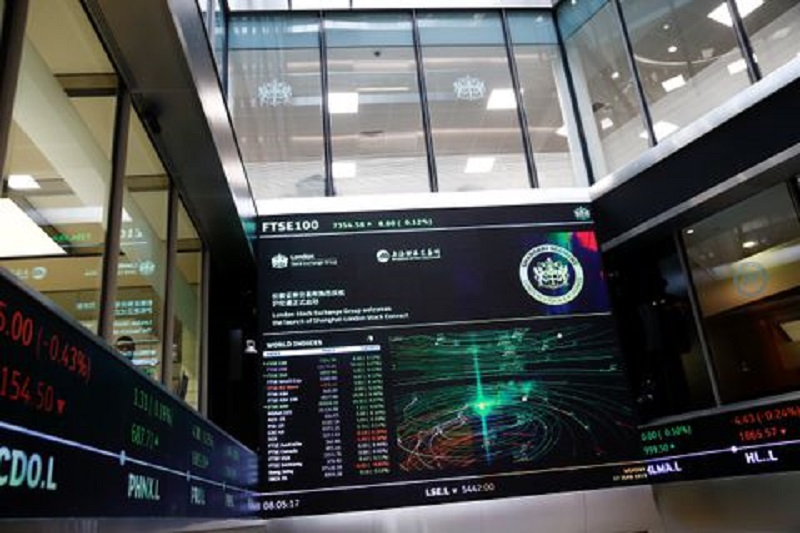Proactive Investors -
- FTSE 100 opens lower, banks fall
- Unemployment steady, average wage growth falls
- Rolls-Royce advances, Citi sets 255p price target
Citi hikes Rolls-Royce price target
Away from the banks and one share doing rather nicely on Tuesday is Rolls-Royce Holdings PLC with shares up 2% at 148p.
The investment bank, Citi, has set a price target of 255p and suggested the results of the performance review, closing performance gaps and releasing working capital could add a further 65p upside.
After looking at the FTSE 100-listed engineer’s underlying cash flow and the upside potential from the CEO’s as yet unquantified turnaround plan Citi concluded Rolls-Royce offers continued strong investment performance.
Citi sees strong underlying cash flow improvement over the next five years, with over £1bn improvement coming from non-systemic elements dropping out and “wide body recovery turning the Civil Aerospace business and improving sentiment.”
FTSE 100 moves off early lows
The Footsie regained some poise and showed signs of stabilising after the heavy losses on Monday as European markets moved higher and US futures pointed to a positive restart in the US.
At 9.00am London’s lead index was down 11.84 points, or 0.2%, at 7,536.79. In Europe the Cac 40 was up 0.2% and the Dax jumped 0.6%. The Euro Stoxx banking index was down 1.2%.
Victoria Scholar, head of investment, interactive investor said: “In a frenetic period for markets, European indices have started the session oscillating between gains and losses with the FTSE 100 trading lower while the DAX is currently in the green.”
In London, the banking sector remained weak but stocks regained some of the opening falls. Lloyds is now down only 0.4% and NatWest has pushed into the green, up 0.1%.
Goldman Sachs thinks the risk of direct banking sector contagion “appears limited, as European banks’ exposure to US deposits is low, and the Euro area and UK banking systems are well capitalised with ample liquidity.”
But the investment bank suggested “the US financial stress could lead to European banks curtailing lending to the real economy and therefore tighten broader financial conditions, amplifying the growth drag already underway.”
The fear that the banking crisis could prompt an economic slowdown saw the oil price fall further with Brent crude down 2% which weighed on BP PLC and Shell, down 1.3% and 1.2% respectively.
One share moving higher was Rolls-Royce Holdings PLC (LSE:RR.) which gained 2.1% as Citi set a 255p price target and reiterated a ‘buy’ rating.
FTSE moves lower at the open
The FTSE 100 moved lower in early trading on Tuesday as banking stocks continued to fall in the wake of the turmoil sparked by the collapse of SVB in the US.
At 8.15am London’s lead index was at 7,535.17, down 11.71points, or 0.16% while the FTSE 250 pushed higher, up 24.18 points, or 0.1%, at 18,849.26.
Financial stocks showed signs of stabilising but were still mostly in the red. Banks headed south with HSBC Holdings PLC down 1.5% after falls in Hong Kong, NatWest Group PLC lost 0.4%, Lloyds Banking Group PLC fell 0.9%. But insurer Aviva PLC rose 0.1%.
The unemployment rate for November 2022 to January 2023 was largely unchanged on the quarter at 3.7%, according to the Office for National Statistics.
Growth in average total pay (including bonuses) was 5.7% and growth in regular pay (excluding bonuses) was 6.5% among employees in November 2022 to January 2023.
Average regular pay growth for the private sector was 7.0% in November 2022 to January 2023, and 4.8% for the public sector. In real terms (adjusted for inflation), growth in total and regular pay fell on the year in November 2022 to January 2023, by 3.2% for total pay and by 2.4 for regular pay.
Total pay was in line with the market consensus and slowed from 6.0%. Regular pay growth came in below consensus of 6.6% and slowed from 6.7% in the three months to December.
Samuel Tombs, chief UK economist at Pantheon Macroeconomics said: “Today’s labour market report strengthens the case for the MPC to hold back from raising Bank Rate further next week, which already had been bolstered by the collapse of two US banks over the weekend. Admittedly, labour market slack is increasing only gradually.”
“Nonetheless, surveys show that recruitment difficulties now are no more pronounced than in before the pandemic, and redundancies look set to pick up over the coming months.”
“Most importantly of all, wage growth has slowed substantially, despite the modest increase in labour market slack.”
Shares in GSK PLC rose 0.2% after it announced positive results from the phase III trial of its MenABCWY combination vaccine candidate in meningococcal, a major cause of meningitis and septicaemia.
The drug, a five-in-one amalgam of treatments, was administered in two doses given six months apart.
It was tested for its safety, tolerability and immunogenicity (its ability to vaccinate) in healthy people aged between 10 and 25 years.
The evaluation had 11 separate goals, or endpoints, and achieved all of them.
But Close Brothers fell 4.6% after it said half-year profit declined amid provisions at Novitas, a provider of loans for legal proceedings. Pre-tax profit in the six months to January 31 plunged 91% year-on-year to £11.7mln from £128.9mln.
Novitas provisions during the half totalled £114.6mln. Novitas was acquired by Close Brothers in 2017 and in 2021 the company decided to permanently cease the approval of lending to new customers across all the products offered by Novitas and withdraw from the legal services financing market.
